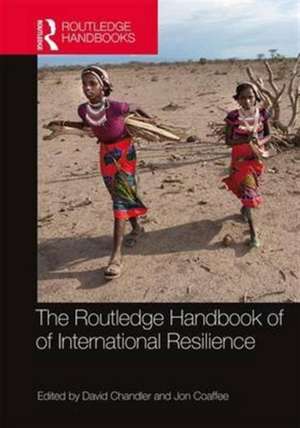The Routledge Handbook of International Resilience
Editat de David Chandler, Jon Coaffeeen Limba Engleză Hardback – 24 noi 2016
The Handbook is divided into nine sections:
- Introduction: contested paradigms of resilience;
- the challenges of resilience;
- governing uncertainty;
- resilience and neoliberalism;
- environmental concerns and climate change adaptation;
- urban planning;
- disaster risk reduction and response;
- international security and insecurity;
- the policy and practices of international development.
| Toate formatele și edițiile | Preț | Express |
|---|---|---|
| Paperback (1) | 384.52 lei 6-8 săpt. | |
| Taylor & Francis – 25 feb 2020 | 384.52 lei 6-8 săpt. | |
| Hardback (1) | 1356.10 lei 6-8 săpt. | |
| Taylor & Francis – 24 noi 2016 | 1356.10 lei 6-8 săpt. |
Preț: 1356.10 lei
Preț vechi: 1898.42 lei
-29% Nou
Puncte Express: 2034
Preț estimativ în valută:
259.57€ • 282.05$ • 218.18£
259.57€ • 282.05$ • 218.18£
Carte tipărită la comandă
Livrare economică 21 aprilie-05 mai
Preluare comenzi: 021 569.72.76
Specificații
ISBN-13: 9781138784321
ISBN-10: 113878432X
Pagini: 420
Ilustrații: 24
Dimensiuni: 174 x 246 x 29 mm
Greutate: 0.86 kg
Ediția:1
Editura: Taylor & Francis
Colecția Routledge
Locul publicării:Oxford, United Kingdom
ISBN-10: 113878432X
Pagini: 420
Ilustrații: 24
Dimensiuni: 174 x 246 x 29 mm
Greutate: 0.86 kg
Ediția:1
Editura: Taylor & Francis
Colecția Routledge
Locul publicării:Oxford, United Kingdom
Public țintă
Postgraduate and UndergraduateCuprins
1) Introduction
1. Introduction
[David Chandler and Jon Coaffee]
2) Challenges
2. The Etymology and Genealogy of a Contested Concept
[Peter Rogers - Macquarie University]
3. Resilience, Security and World Politics
[Philippe Bourbeau - Cambridge University]
4. Making Resilience Strange: Ontological Politics in a ‘Time of Crisis’
[Samuel Randalls - University College London, and Stephanie Simon - University of Amsterdam]
5. Why Resilience is Unappealing to Social Science: Theoretical and Empirical Investigations of the Scientific use of Resilience
[Lennart Olsson, Anne Jerneck, Henrik Thoren, Johannes Persson and David O’Byrne]
6. The Nature of Resilience
[Chris Zebrowski - University of Loughborough]
3) Uncertainty
7. The Problem of the Present: Reconciling Social Justice with Resilience Planning’s Future Orientation in the Transition Town movement
[Charis Ford Morrison Boke - Cornell University]
8. The Promise of Resilience
[Claudia Aradau - Kings College London]
9.The Digitization of Resilience
[Mareile Kaufmann - PRIO]
10. Resilience and the Inversion of Possibility and Reality
[Jessica Schmidt - University of Duisburg-Essen
4) Neoliberalism
11. Resilience and Neoliberalism
[David Chandler - University of Westminster]
12. Resilience, Power and Money: Limitations and Prospects of Systems Ecology in Envisaging a Sustainable World Economy
[Alf Hornborg - Lund University]
13. Resilience, Governmentality and Neoliberalism
[Jonathan Joseph - University of Sheffield]
5) Environment
14. Climate Change and Security: From Paradigmatic Resilience to Resilience Multiple
[Delf Rothe - University of Hamburg]
15. Resilience and the neoliberal counterrevolution: From ecologies of control to production of the common
[Sara H. Nelson - University of Minnesota]
16. Resilience of What to What: Evidence from Pastoral Contexts in East Africa and Central Asia
[Chuan Liao - Cornell University, and Ding Fei - University of Minnesota]
6) Urban Planning
17. A Resilient Urban Planning Paradigm: Design, Governance, Adaption and Maladaptation
[Jonathan Clarke - University of Warwick]
18. Resilience and territorial cohesion: different origins, similar destination
[Simin Davoudi]
19. Resilience and the ‘business as usual’ paradox
[Paul O’Hare Manchester Metropolitan University, Iain White - University of Waikato, and Angela Connelly - University of Manchester]
7) Disaster Response
20. Realities of resilience: Reflecting on the value of a resilience approach in practice
[C.W.J. de Milliano and J. Jurriens]
21. Managing Disaster Risk and Resilience in the UK: Response vs. Prevention In Policy and Practice
[Lee Bosher and Ksenia Chmutina – Loughborough University]
22. ‘Bouncing back’ to Capitalism? Grassroots autonomous activism in shaping discourses of resilience and transformation following disaster.
[Raven Cretney - Victoria University, and Sophie Bond - University of Otago]
8) Insecurity
23. The politics, practices and tensions of security-driven resilience
[Jon Coaffee – University of Warwick, Pete Fussey - University of Essex]
24. Resilience and Disaster Sites: The Disastrous Temporality of the ‘Recovery-to-Come’
[Charlotte Heath-Kelly - University of Warwick)]
25. Bowling with Terrorists: Securing Civic Resilience to Prevent Extremism in the UK
[Jessica West - Balsillie School of International Affairs]
26. The Resilient Subject
[Brad Evans - University of Bristol, and Julian Reid - University of Lapland]
9) International Development
27. Resilience and development among ultra-poor household in rural Ethiopia
[Brian Thiede - Louisiana State University]
28. Developing resilience: a retreat from grand planning
[Søren Vester Haldrup and Frederik Rosén]
29. Resilience and the post-colonial: hidden transcripts of resilience in Jamaican disaster management
[Kevin Grove - Florida International University]
10) Conclusion
30. Conclusion: The Future of Resilience
[Jon Coaffee and David Chandler]
1. Introduction
[David Chandler and Jon Coaffee]
2) Challenges
2. The Etymology and Genealogy of a Contested Concept
[Peter Rogers - Macquarie University]
3. Resilience, Security and World Politics
[Philippe Bourbeau - Cambridge University]
4. Making Resilience Strange: Ontological Politics in a ‘Time of Crisis’
[Samuel Randalls - University College London, and Stephanie Simon - University of Amsterdam]
5. Why Resilience is Unappealing to Social Science: Theoretical and Empirical Investigations of the Scientific use of Resilience
[Lennart Olsson, Anne Jerneck, Henrik Thoren, Johannes Persson and David O’Byrne]
6. The Nature of Resilience
[Chris Zebrowski - University of Loughborough]
3) Uncertainty
7. The Problem of the Present: Reconciling Social Justice with Resilience Planning’s Future Orientation in the Transition Town movement
[Charis Ford Morrison Boke - Cornell University]
8. The Promise of Resilience
[Claudia Aradau - Kings College London]
9.The Digitization of Resilience
[Mareile Kaufmann - PRIO]
10. Resilience and the Inversion of Possibility and Reality
[Jessica Schmidt - University of Duisburg-Essen
4) Neoliberalism
11. Resilience and Neoliberalism
[David Chandler - University of Westminster]
12. Resilience, Power and Money: Limitations and Prospects of Systems Ecology in Envisaging a Sustainable World Economy
[Alf Hornborg - Lund University]
13. Resilience, Governmentality and Neoliberalism
[Jonathan Joseph - University of Sheffield]
5) Environment
14. Climate Change and Security: From Paradigmatic Resilience to Resilience Multiple
[Delf Rothe - University of Hamburg]
15. Resilience and the neoliberal counterrevolution: From ecologies of control to production of the common
[Sara H. Nelson - University of Minnesota]
16. Resilience of What to What: Evidence from Pastoral Contexts in East Africa and Central Asia
[Chuan Liao - Cornell University, and Ding Fei - University of Minnesota]
6) Urban Planning
17. A Resilient Urban Planning Paradigm: Design, Governance, Adaption and Maladaptation
[Jonathan Clarke - University of Warwick]
18. Resilience and territorial cohesion: different origins, similar destination
[Simin Davoudi]
19. Resilience and the ‘business as usual’ paradox
[Paul O’Hare Manchester Metropolitan University, Iain White - University of Waikato, and Angela Connelly - University of Manchester]
7) Disaster Response
20. Realities of resilience: Reflecting on the value of a resilience approach in practice
[C.W.J. de Milliano and J. Jurriens]
21. Managing Disaster Risk and Resilience in the UK: Response vs. Prevention In Policy and Practice
[Lee Bosher and Ksenia Chmutina – Loughborough University]
22. ‘Bouncing back’ to Capitalism? Grassroots autonomous activism in shaping discourses of resilience and transformation following disaster.
[Raven Cretney - Victoria University, and Sophie Bond - University of Otago]
8) Insecurity
23. The politics, practices and tensions of security-driven resilience
[Jon Coaffee – University of Warwick, Pete Fussey - University of Essex]
24. Resilience and Disaster Sites: The Disastrous Temporality of the ‘Recovery-to-Come’
[Charlotte Heath-Kelly - University of Warwick)]
25. Bowling with Terrorists: Securing Civic Resilience to Prevent Extremism in the UK
[Jessica West - Balsillie School of International Affairs]
26. The Resilient Subject
[Brad Evans - University of Bristol, and Julian Reid - University of Lapland]
9) International Development
27. Resilience and development among ultra-poor household in rural Ethiopia
[Brian Thiede - Louisiana State University]
28. Developing resilience: a retreat from grand planning
[Søren Vester Haldrup and Frederik Rosén]
29. Resilience and the post-colonial: hidden transcripts of resilience in Jamaican disaster management
[Kevin Grove - Florida International University]
10) Conclusion
30. Conclusion: The Future of Resilience
[Jon Coaffee and David Chandler]
Notă biografică
David Chandler is Professor of International Relations, Department of Politics and International Relations, University of Westminster, UK, and editor of the journal Resilience: International Policies, Practices and Discourses.
Jon Coaffee is Professor in Urban Geography, the Department of Politics and International Studies, University of Warwick, UK. At Warwick, Jon has established the Resilient Cities Laboratory, and directs the Warwick Institute for the Science of Cities.
Jon Coaffee is Professor in Urban Geography, the Department of Politics and International Studies, University of Warwick, UK. At Warwick, Jon has established the Resilient Cities Laboratory, and directs the Warwick Institute for the Science of Cities.
Descriere
Edited by leading academic authorities from the fields of human geography and international relations, this is the first handbook to deal with resilience as a new conceptual approach to understanding and addressing problems. The collection highlights that resilience-thinking is increasingly transforming international policy-making and government and institutional practices.











